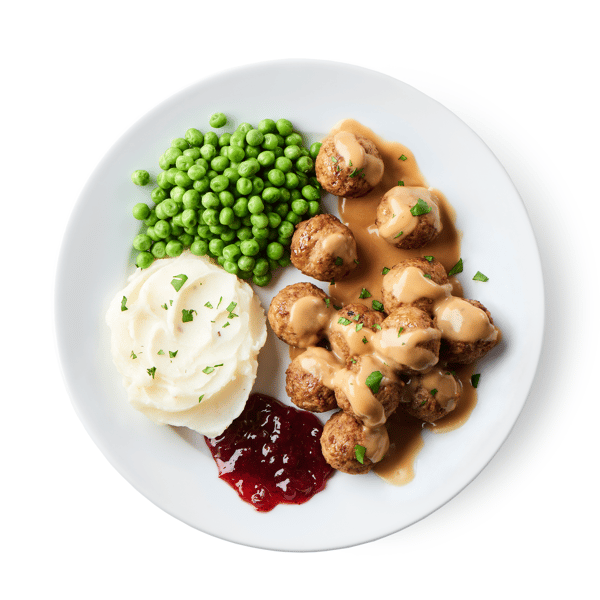Lingonberries are small, red fruits that resemble cranberries in taste, though they're slightly less tart. These berries grow on a low-growing evergreen shrub, *Vaccinium vitis-idaea*, native to the Scandinavian region in northern Europe. Lingonberries are already popular in Scandinavian cuisine where they are used in sauces and eaten with meatballs. You can find lingonberry jam in all supermarkets and IKEA.

©IKEA
Commonly referred to by various names such as bearberry, redberry, partridgeberry, foxberry, cowberry, and Alaskan lowbush cranberry, lingonberries have earned a reputation as a "superfruit" due to their rich nutritional profile and possible health advantages, including benefits for weight management and heart health.
Below are six impressive health benefits linked to lingonberries.
-
Rich in Antioxidants
Lingonberries stand out for their abundance of antioxidants and beneficial plant compounds. A 100-gram serving (roughly ¾ cup) offers 139% of the Recommended Daily Intake (RDI) of manganese, an essential mineral that supports one of the body's key antioxidant enzymes — superoxide dismutase.
This same serving also provides 10% and 12% of the RDIs for vitamins E and C, respectively, both known for their antioxidant properties. Additionally, lingonberries are rich in plant compounds like anthocyanins and flavonoids, which are responsible for the berry's red hue and offer potential antioxidant and anti-inflammatory effects.
Notably, lingonberries also contain quercetin, a flavonoid that acts as both an antioxidant and anti-inflammatory agent, potentially lowering the risk of conditions such as high blood pressure and heart disease.

-
Supports Healthy Gut Bacteria
Your gut microbiota — the collection of microbes in your digestive system — plays a crucial role in overall health, and your diet significantly affects its composition.
Animal studies have shown that lingonberries can influence the balance of gut bacteria, promoting gut health and reducing low-grade inflammation. For instance, in one study, mice fed a high-fat diet along with lingonberries for 11 weeks experienced an increase in *Akkermansia muciniphila*, a bacteria known for maintaining the health of the gut lining.
Since chronic inflammation is linked to various health conditions, such as heart disease and type 2 diabetes, including lingonberries in your diet could help combat inflammation and support a healthy gut. However, more research involving humans is needed.

-
May Assist with Weight Management
Lingonberries are low in calories, with only 54 calories per 100-gram serving, making them a good choice for those looking to manage their weight. However, the benefits of lingonberries for weight control may go beyond their low calorie content.
In a study involving mice fed a high-fat diet, those consuming lingonberries experienced a 21% reduction in weight compared to those on the same diet without the berries. These mice also had lower body fat percentages and maintained their lean body mass more effectively than mice consuming other types of berries.
This weight-related benefit may be related to the influence of lingonberries on gut bacteria, particularly in reducing the abundance of Firmicutes, a type of bacteria linked to higher body weight.

-
Helps Regulate Blood Sugar Levels
Both animal and test-tube studies suggest that lingonberries and their extracts may contribute to blood sugar regulation, likely due to their high fiber and polyphenol content.
Preliminary research in humans supports these findings. For example, when healthy men consumed sweetened yogurt mixed with lingonberry powder, their blood sugar and insulin levels remained similar to when they ate plain yogurt, even with the additional carbohydrates from the lingonberries.
Maintaining balanced insulin levels can help prevent insulin resistance, lowering the risk of type 2 diabetes and obesity.

-
May Protect Kidney Health
In studies on rats undergoing kidney operations, those that consumed lingonberry juice for three weeks before surgery showed improved kidney function, reduced stress on the kidneys, and less inflammation compared to rats that did not receive the juice. This suggests that lingonberries may offer protective effects for kidney health.

-
Potential to Reduce Urinary Tract Infections (UTIs)
There’s evidence suggesting that lingonberry juice, particularly when combined with cranberry juice, may reduce the recurrence of urinary tract infections. In one study, women who drank a blend of cranberry and lingonberry juice over six months had a 20% lower risk of recurring UTIs. However, more research is needed to determine if lingonberries alone offer this benefit.

Tips for Using Lingonberries
Here are a few ways you can enjoy lingonberries in your diet:
- Add lingonberry powder to yogurt, smoothies, or protein shakes.
- Incorporate lingonberries powder into scones, muffins, or other baked goods.
- Mix them into oatmeal or cold cereal.
- Add lingonberry powder to hot or cold teas.

Even though fresh lingonberries may be hard to find, you can often get them frozen or powdered, making it easy to include them in smoothies, baked goods, or yogurt. Just be cautious of sugar-sweetened lingonberry products, like jams and sauces.

Reference:
Heyman-Lindén L, Kotowska D, Sand E, Bjursell M, Plaza M, Turner C, Holm C, Fåk F, Berger K. Lingonberries alter the gut microbiota and prevent low-grade inflammation in high-fat diet fed mice. Food Nutr Res. 2016 Apr 27;60:29993. doi: 10.3402/fnr.v60.29993. PMID: 27125264; PMCID: PMC4850145.
Heyman L, Axling U, Blanco N, Sterner O, Holm C, Berger K. Evaluation of Beneficial Metabolic Effects of Berries in High-Fat Fed C57BL/6J Mice. J Nutr Metab. 2014;2014:403041. doi: 10.1155/2014/403041. Epub 2014 Jan 14. PMID: 24669315; PMCID: PMC3941780.
Linderborg KM, Järvinen R, Lehtonen HM, Viitanen M, Kallio HP. The fiber and/or polyphenols present in lingonberries null the glycemic effect of the sugars present in the berries when consumed together with added glucose in healthy human volunteers. Nutr Res. 2012 Jul;32(7):471-8. doi: 10.1016/j.nutres.2012.06.004. Epub 2012 Jul 18. PMID: 22901554.
Törrönen R, Kolehmainen M, Sarkkinen E, Mykkänen H, Niskanen L. Postprandial glucose, insulin, and free fatty acid responses to sucrose consumed with blackcurrants and lingonberries in healthy women. Am J Clin Nutr. 2012 Sep;96(3):527-33. doi: 10.3945/ajcn.112.042184. Epub 2012 Aug 1. PMID: 22854401.
Kontiokari T, Sundqvist K, Nuutinen M, Pokka T, Koskela M, Uhari M. Randomised trial of cranberry-lingonberry juice and Lactobacillus GG drink for the prevention of urinary tract infections in women. BMJ. 2001 Jun 30;322(7302):1571. doi: 10.1136/bmj.322.7302.1571. PMID: 11431298; PMCID: PMC33514.
Agriculture and Agri-Food Canada. (n.d.). Lingonberries: Good for your heart, good for your kidneys, and good for agriculture. Government of Canada. https://agriculture.canada.ca/en/science/story-agricultural-science/scientific-achievements-agriculture/lingonberries-good-your-heart-good-your-kidneys-and-good-agriculture


